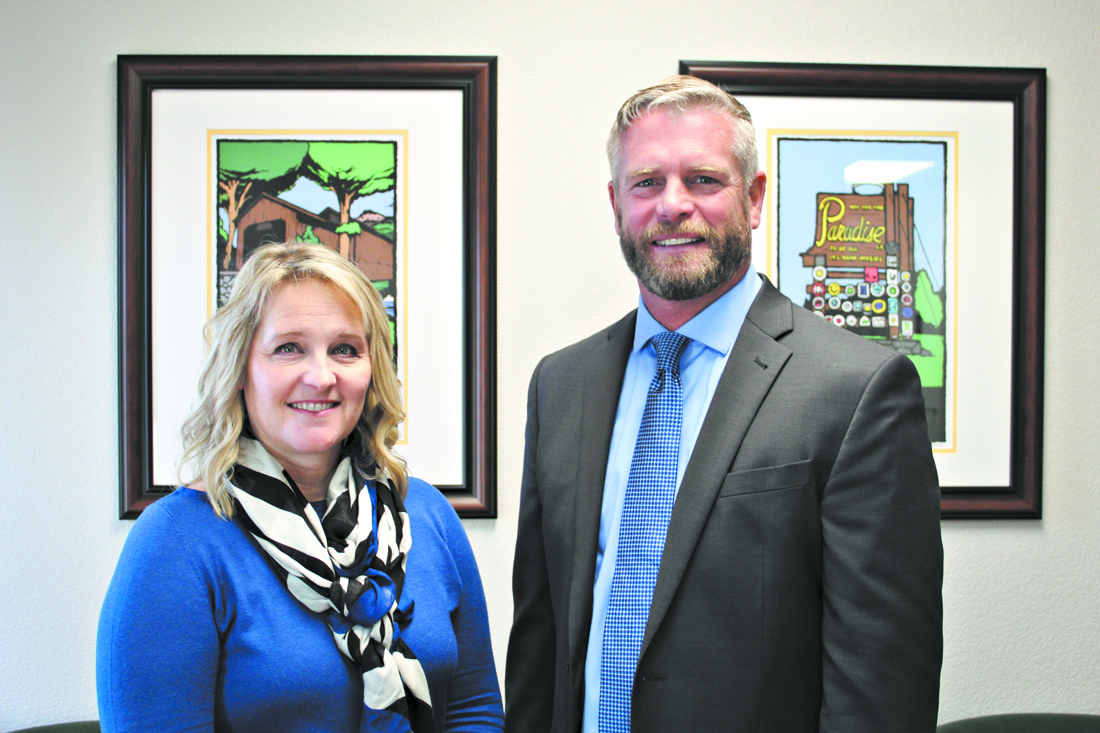
Photo by Ashiah Scharaga
Shelby Boston, director of the Butte County Department of Employment and Social Services, and Scott Kennelly, interim director of Butte County Behavioral Health, say the goal of the new Community Services Center is to help improve Camp Fire survivors’ access to care.
Since the Camp Fire, Jessica Gilligan, a youth clinician with Butte County Behavioral Health, has had to meet her clients in a variety of unconventional places: RVs, churches, park benches, schools.
This has presented new challenges to providing care. For example, it’s been difficult to create a comfortable space for kids to talk, Gilligan told the CN&R. “They’re not going to fully open up and trust the process if half their mind is wondering, Who’s listening through the wall?” or what someone nearby could overhear, she said.
Gilligan used to see her clients at the Paradise Community Counseling Center. She’d been there for three years before the Camp Fire. But like so much of the Ridge’s health providers, her team scattered after the disaster—she moved to the county’s community counseling center in Chico; others ended up at facilities in Gridley or Oroville.
Early this month, however, Gilligan officially joined the staff of a new office in Paradise shared by Behavioral Health and the Department of Employment and Social Services (DESS): the Butte County Community Services Center.
On the center’s first day (Jan. 6), the excitement was palpable for Gilligan and her colleagues, who were working together again for the first time since Nov. 8, 2018, the day the fire torched the Ridge. It’s the county’s hope that this facility, located on the Skyway, will make life easier for survivors by creating a local one-stop shop for important services.
People already are showing interest—the center has either seen or re-opened the cases of 54 clients (35 youth and 19 adults). And county officials believe that demand will grow. There are approximately 3,700 active clients who still show a Ridge address on file.
Before the fire, both departments were providing services on the Ridge across multiple locations, said Scott Kennelly, interim director of Behavioral Health. Now, they are housed in the same building, with DESS on one side and Behavioral Health on the other. The county is leasing the building from Youth for Change, he added, which used to use it for office space.
Behavioral Health is providing adult and youth counseling services, Kennelly said, and will add psychiatric telemedicine next month. Kennelly added that he’s interested in reopening The Hub Wellness and Recovery Center there, but that will depend on staffing. The Hub, which was destroyed in the fire, offered critical wellness services, he said, such as peer-led recovery-oriented support groups (e.g., tobacco cessation, substance abuse) as well as yoga, Tai Chi and art classes.
On the DESS side of things, eligibility workers help clients sign up for Medi-Cal and programs such as CalFresh, said Shelby Boston, the department’s director. On opening day, she led the CN&R on a tour while DESS employees worked at their computers. Boston was enthusiastic about putting the finishing touches on the building’s resource area, where clients are free to use computers to refine résumés and search for work.
It’s not just county departments that have a presence at the Community Services Center; there’s also office space for local organizations. Northern Valley Catholic Social Services is offering disaster case management, and Catalyst Domestic Violence Services, which lost its Paradise location in the fire, is seeing clients there and providing restraining order services. Crisis outreach volunteers with California HOPE, which had been headquartered in Oroville, also are there now, making it easier for them to reach rural Ridge areas.
Transportation is still a significant barrier for clients when it comes to accessing care, several county employees told the CN&R. Many families have had to make tough calls, like paying for diapers or the gas to drive to an appointment outside of town, said Gilligan, the Behavioral Health youth clinician.
Youth counselor Cheryl Oberg, Gilligan’s co-worker, added that the Ridge location is a source of not just financial relief but also emotional relief—while the county provided some services on the Ridge, a lot of people had to make trips to Chico or Oroville since the fire, and it was a real hardship.
“It’s really important for us to have a presence here,” she said. “A lot of times people [have said], ‘I just can’t get there.’”
The Paradise center likely will improve staff efficiency as well, employees told the CN&R.
Since the fire, the county has had workers reaching out to survivors across the Ridge, Kennelly said. Like Gilligan, they traveled to various locations to provide care. In the meantime, the county did a lot of assessing before deciding whether to open a physical location again. For example, it had to determine how many children would return to Ridge schools, and how many people would choose to stay in the region.
It became clear through its work and conversations with survivors that there was definitely a large enough population in need of help to warrant re-establishing a location on the Ridge, Kennelly said.
“As soon as we realized we had enough people that were interested and available … we started looking for locations,” he added, and pursuing grant funding.
The county received a one-time $100,000 grant from the North Valley Community Foundation to help open the center. But it’s Kennelly and Boston’s hope that it will grow and become an integral part of the recovery on the Ridge.
“There are people here and they already have so many barriers and challenges to their progress,” Boston said. “This is a place they can come and get whatever service they need.”
